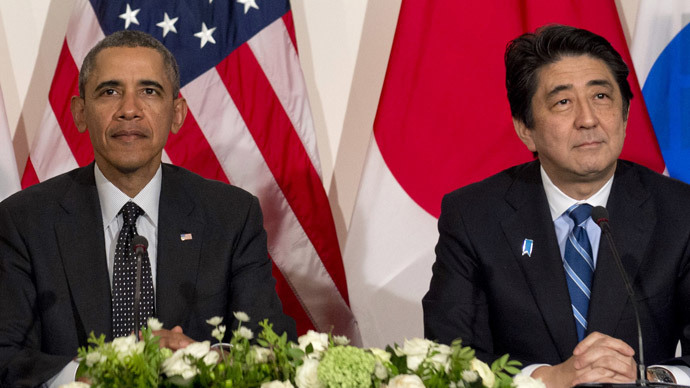The ‘hope’ having evaporated, the ‘change’ largely absent, President Obama is visiting Japan April 24-25 with a free trade agenda. However, cracks appear to be emerging in the president’s ‘Pivot to Asia’.
The Obama Presidential legacy-building machine is under duress. His second term has quickly led to a widespread sense of bafflement as to quite why he was re-elected, let alone first gained office. That great sweep of ‘hope’ and ‘change’ has resulted in a ‘dithering’, intrusive presidency exhibiting a greater drone bloodlust than his less-than-dove-ish predecessor.
Having snubbed and snooped Europe with equal vigor, President Obama is now focusing on free trade to deliver a legacy with the US developing two massive multilateral prongs. TTIP could revolutionize trans-Atlantic trade, but always risks becoming a socialist corporate wheeze for meddling big government and anti-enterprise multinationals to protect the status quo, denying consumers the small business benefits of innovation from the bottom up.
Of course Europe has barely been an afterthought for the Obama Presidency (apart from surveillance priority, some might argue) and thus the great ‘pivot’ has been a largely empty promise to date. Other than snubbing the Europeans, any achievements in Asia are remarkably opaque. However, that’s not to deny the hurried, almost frenzied, impetus from Washington as US negotiators crisscross Asia to create a dozen-nation Trans-Pacific Partnership. Thus multiple bilateral agreements are in gestation alongside the ambitious TTP itself.
President Obama’s trip to Japan on April 24-25 has long been publicized as the moment when a Japanese-US deal will be completed. However, the process is not going well on several levels. Japan’s concerns about increasing Chinese assertions over disputed islands aligns with increasing fears that the US appears weak and incapable of intervention despite its military might. Meanwhile Tokyo bridles at American moral judgment over Prime Minister Abe visiting the controversial Yasukuni shrine.
Recently Japan has remained in the background at the G7 when Russian sanctions have been championed by President Obama in his curious new persona as a neocon puppet with his strings pulled by staffers such as Victoria Nuland. In the wake of the 2011 Fukushima nuclear disaster, Japan is keen to keep its energy options open, thus Tokyo has been pivoting towards Russia in recent years, further complicating the gradually widening gulf with Washington.
The US, despite the much touted Asian rebalance, has appeared, at best, aloof to Japanese sympathies for some time. (In the halls of power Japanese officials apparently mutter darkly about how the Democrats have become the party of Chinese hegemony, while at least a Republican president would appreciate the special relationship with Japan and respect the appropriate defense protocols in the face of perceived Chinese aggression). In essence the Obama pivot appears to be as ham-fisted in its implementation as the healthcare fiasco.
Back to Free Trade, the two sides apparently remain some distance from a deal. Progress may require long hours in smoke-filled rooms, presumably causing Obama officials great liberal angst over passive nicotine risks. Without such progress, a remarkably vacuous state visit will result. The chances of a deal in one week are, frankly, remote given the chasm between the parties at recent negotiations. All those frequent flyer miles on Air Force One might yet prove to be accrued more in hope than substance.
The substance in this case often concerns foodstuffs. Many nations have powerful farming lobbies. Japan and the US are little different to the EU where French farmers frequently cultivate barricades and mass demonstrations faster than their cash crops. Japan would mitigate farm subsidies, but elimination (a key TPP goal) is not seen as feasible. PM Abe is picking his battles carefully in his radical repositioning of Japan. Japanese rice remains a remarkable bastion of protectionism along with beef, pork and dairy produce. Then there is the thorny automotive issue. Detroit makes many great vehicles but generous pension liabilities renders them uncompetitive compared with Japan’s exports (subject to 2.5-10 percent tariffs Stateside, ranging from cars to light trucks).
With trade deals, analysts always ask “where’s the beef?” In the TTP process, it is precisely issues such as beef which cause huge headaches, especially between major producers such as Australia, Japan and the USA (currently all three have agreed, or are discussing, different beef tariff levels!).
Obama may be on another flight of ‘hope’ when it comes to free trade, both literally and metaphorically. Can he touchdown in Tokyo April 24 and achieve a deal? His wilting reputation needs a fillip as a TTP/TTIP legacy appears to be slipping away as his administration struggles to manage the process.
The statements, views and opinions expressed in this column are solely those of the author and do not necessarily represent those of RT.
The statements, views and opinions expressed in this column are solely those of the author and do not necessarily represent those of RT.


